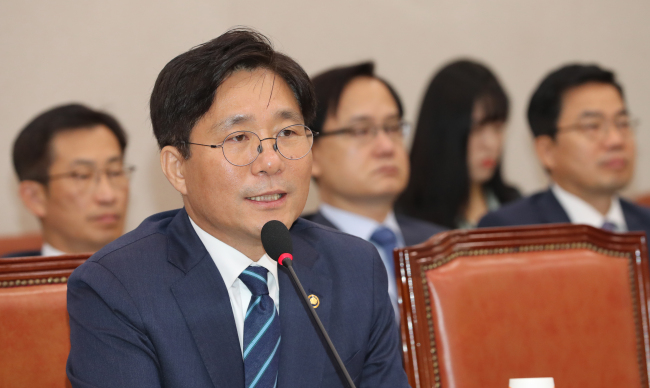The confirmation hearing held Wednesday for Sung Yun-mo, the nominee for minister of trade, industry and energy, pivoted mostly on the government’s plan to phase out nuclear energy and the potential impact of that plan on the nation’s electricity rates.
While Sung and the ruling Democratic Party advocated major changes to the current energy-supply paradigm, the largely conservative opposition camp accused the nominee of flip-flopping from his earlier support for nuclear power.
“The nominee was in charge of the government’s electric power supply plan in 2006, while he was working (on the) electricity industry team at the ministry (under the Roh Moo-hyun administration),” said Rep. Lee Chul-gyu of the main opposition Liberty Korea Party.

Minister of trade, industry and energy nominee Sung Yun-mo answers lawmakers’ questions at his confirmation hearing at the National Assembly on Wednesday. (Yonhap)
“Is it that the safety of nuclear power retrogressed over the past 12 years, or is it because operational costs (for nuclear power) increased during that period?”
In a written answer submitted to Rep. Kwon Chil-seung of the ruling Democratic Party of Korea, Sung advocated President Moon Jae-in’s nuclear phaseout blueprint, saying a shift away from nuclear energy was necessary for the country.
Seoul’s energy policy goals include raising the proportion of energy generated from renewable sources to 20 percent of the total by 2030. Another goal is the incremental phaseout of nuclear power plants. Currently the number of nuclear power plants stands at 24.
To ensure a consistent energy supply, the government’s strategy involves shutting down the 10 oldest reactors between now and 2030, while going ahead with the nuclear power plant construction projects that are already planned. The government does not, however, intend to initiate any additional nuclear power plant construction projects.
Explaining his change of policy stance, Sung cited growing public calls for safety and growing public awareness about energy policy.
“Nuclear power was once a valid future energy sector, which succeeded in boosting (the country’s) competitiveness in the aftermath of the global oil shock,” he said.
“Now we plan to build upon such past experiences and foster renewable energy as a new growth engine.”
Rep. Kim Sam-hwa of the centrist-conservative minority Bareunmirae Party raised the matter of electricity costs.
“It is crucial to let the people know that electric power rates will inevitably increase in the (process of shifting to different sources of energy),” the lawmaker said.
Sung responded that until 2022, implementing the government’s blueprint would bring about no significant increase in electricity rates.
“The energy shift is to take place over the long term and until 2022, the number of nuclear power plants will remain on an uptrend and so will the proportion of electric power generation,” he said.
“Power rates are influenced by multiple factors, including the cost of materials, so the overall impact (of the energy policy shift) should be figured out in a more comprehensive context.”
Sung also asserted that the recent operating losses experienced by the state-run Korea Electric Power Corporation were not directly attributable to the government’s energy vision. Kepco, whose annual operating profits exceeded 10 trillion won ($8.9 billion) in 2015 and 2016, suffered net losses of over 1 trillion won in the first half of this year.
The 55-year-old nominee is a former chief of the Korean Intellectual Property Office and a longtime official with the Trade Ministry.
By Bae Hyun-jung (
tellme@heraldcorp.com)





![[From the Scene] Monks, Buddhists hail return of remains of Buddhas](http://res.heraldm.com/phpwas/restmb_idxmake.php?idx=645&simg=/content/image/2024/04/19/20240419050617_0.jpg&u=20240419175937)
